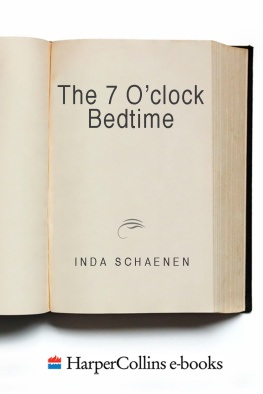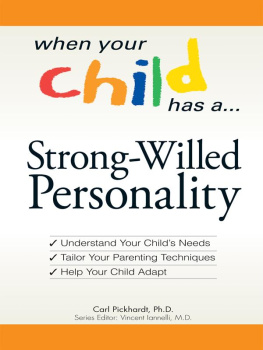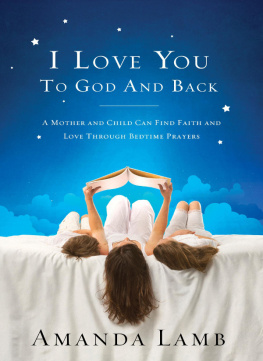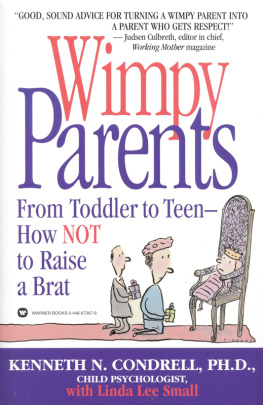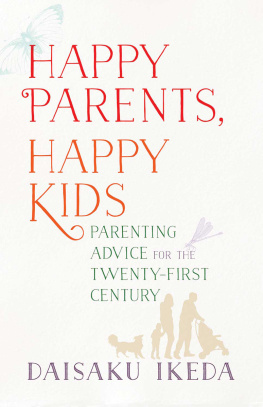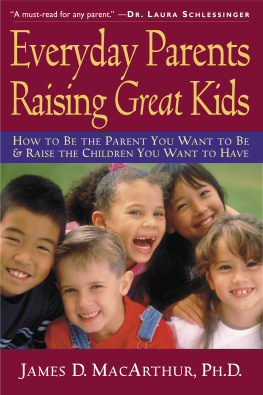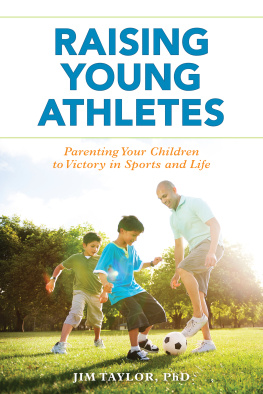To my husband and our children
Only that day dawns to which we are awake.
H ENRY D AVID T HOREAU , Walden
Contents
The 7 oclock bedtime... to a weary, bleary-eyed veteran of the daily skirmishes of parenthood, the phrase is like a clarion call. It conjures up myriad fantasies: evenings spent in glorious solitude, romantic spousal reacquainting dinners, hour-long bubble bath marathons, a pottery class here, a New York Times best-seller read in one sitting there. It has the power to evoke heady visions of Dr. Denton pajamaclad, apple-cheeked moppets marching cheerily off to dreamland, only to wake the following morning with well-scrubbed and smiling faces to greet the new day....
What interrupts, of course, with boorish swiftness, are the voices of Reason, Doubt, and Guilt, those constant comrades-in-arms of the working parent. What about cutting into Quality Time, we protest, a transgression second only to a diet consisting solely of french fries in the modern parents handbook of deadly sins? What child, we sigh, when faced with the lure of the Cartoon Network or the seductive glow of a flickering computer screen, would actually choose bed? (At least without a protest, the magnitude of which defies both imagination and our already meager coping strategies?) And besides, we reason, isnt it cruel? So, reluctantly, we place this slim volume back on the bookstore shelf for some other better, stronger, wiser parent to pick up and employ.
Dont. I am here to tell you that you are that better, stronger, wiser parent, whether you believe it or not. And what will make that possible, as so eloquently argued by Inda Schaenen, will be your newfound, unswerving, well-reasoned conviction that this is in the best interest of your child. Once persuaded that a good nights sleep, much like nutrition, seat belts, and a roof over ones head, is not only an inalienable right of every child and parent but a bona fide parental responsibility, you are more than halfway there.
And if Ms. Schaenens elegant prose is not quite enough to convince you, heed this. There is a growing body of scientific literature, certain to expand significantly in the next few years, that demonstrates clearly the often dire consequences of inadequate sleep in children, ranging from mood disturbances (what we behavioral scientists like to term lack of positive affect , and what every parent recognizes as the crankies ), to deficits in attention and short-term memory, to poor performance in the classroom. Coupled with these empirical arguments is the clinical experience of a host of pediatric professionals like me, who have directly observed over and over again in our small, sleep-deprived patients the link between poor sleep and behavior problems, school failure, and attention deficit hyperactivity disorder. Not to mention the teachers, school nurses, guidance counselors, and coaches who must struggle daily with the aftermath of what I have come to call (with apologies to the folks at Disney) the Sleepy, Dopey, Grumpy Syndrome .
So take heart. If the old adage you reap what you sow contains even a grain of truth, you and your child will reap the benefits of the sandmans sack a thousandfold. And while youre at it, you might just find that you dont need that second double-shot espresso mocha latte to have a good day.
Judith A. Owens, M.D., M.P.H., director, Pediatric Sleep Disorders Clinic; director, Learning, Attention, and Behavior Program, Hasbro Childrens Hospital; associate professor of pediatrics, Brown University School of Medicine
Its ten past seven on a Monday night. I am the only adult in the house (my husband is working late), and Ive just put our three childrenages ten, seven, and fourto bed. I promise you this is true. Whats more, with the exceptions resulting from special events, illness, and travel, its true almost every single night of the week: seven oclock means bedtime.
Most people laugh at me. Some envy me. Some scorn my adherence to an apparently draconian schedule, call me a rigid control freak. What can I say? Call me anything you want, just dont call me after seven at night, because thats when I am totally off duty, at least as a mother. My parenting day done, I have a few hours every evening to use as I wish. When the children were very young and I had no free time during the day, I used to leave my husband home with them and pop out two or three times a week for a seven-thirty aerobics class. These days, I usually head for my desk and perform the work I actually get paid to do. Other nights I crawl into bed at seven-fifteen, read for an hour, and spend the next ten hours catching up on my own sleep. Some evenings I spend with my husband, either at home or out for dinner and a movie.
But whatever I do, the evening hours are my own, and my children get enough sleep to grow on.
If you are completely happy with the rhythms of your family life, feel free to stop reading right now. But if something feels wrong about your days and nights; if your kids are harried, cranky, and unpleasant; if they are having trouble in school or their behavior is not up to your standards or expectations; if you end each day angry and resentful, or guilty and fretful; or if it seems to you that your children have more say in their bedtime than you do, then you may well think about how you might manage things differently.
Naturally, it is much easier to set up a routine when your first baby is very young. But if you are convinced that having an early routine is a good thing for you, I am sure it is possible to help even older children make the changes you need to make. While I may refer from time to time to the needs of teenagers, I am confining this book to the years between infancy and the onset of puberty. How teenage biology relates to teenage sleep is a lively field unto itself, a field currently being studied by researchers like Mary Carskadon at Brown University, Carla Wahlstrom at the University of Minnesota, and many others. Physical and chemical changes in the teenagers brain lend themselves to multiple interpretations. In addition to biology, other variables such as part-time jobs, onerous loads of homework, after-school activities, increased social independence, and school starting times factor into the sleep of adolescents. Their habits and routines are beyond the scope of this book.
Its hard not to wonder, though, whether the patterns we have established during their prepubescent years will sustain our children as they grow into teenagers. I have no idea. I doubt that three years from now my ten-year-old will be closing her eyes at seven-thirty; I can, however, imagine that because of her childhood rhythms, she may be more likely to remain the early bird she has always been. Certainly, because she is being raised to respect her biological need for an adequate amount of sleep, she will assume that regulating her hours of sleep is as important as regulating her consumption of cookies after a meal.
Please understand, then, that the very concept of the 7 oclock bedtime can be understood metaphorically, as representative of a larger set of values parents may wish to impart to their children regarding the rhythm of daily life. If you accept that the most significant organizing principle and determining factor in a childs day is his sleep, then you will be more comfortable considering the adjustments and sacrifices this principle demands. Establishing an early bedtime is a highly personal and individual choice, one that requires you to see the big picture at all times. It helps if you conceive of enforced, obligatory wakefulness as shocking as the idea of tying children to mattresses and gluing their eyelids shut.
It is just as important to help our children maintain consistent schedules through infancy, childhood, and adolescence, Richard Ferber writes in his canonical if controversial book Solve Your Childs Sleep Problems. In fact all of us, regardless of age, function best when we keep regular schedules. Studies in adults have shown that irregular sleep-wake patterns lead to significant alterations in our moods and sense of well-being, and undermine our ability to sleep at the desired times. The same is true of young children, although many parents dont seem to appreciate this fact.

